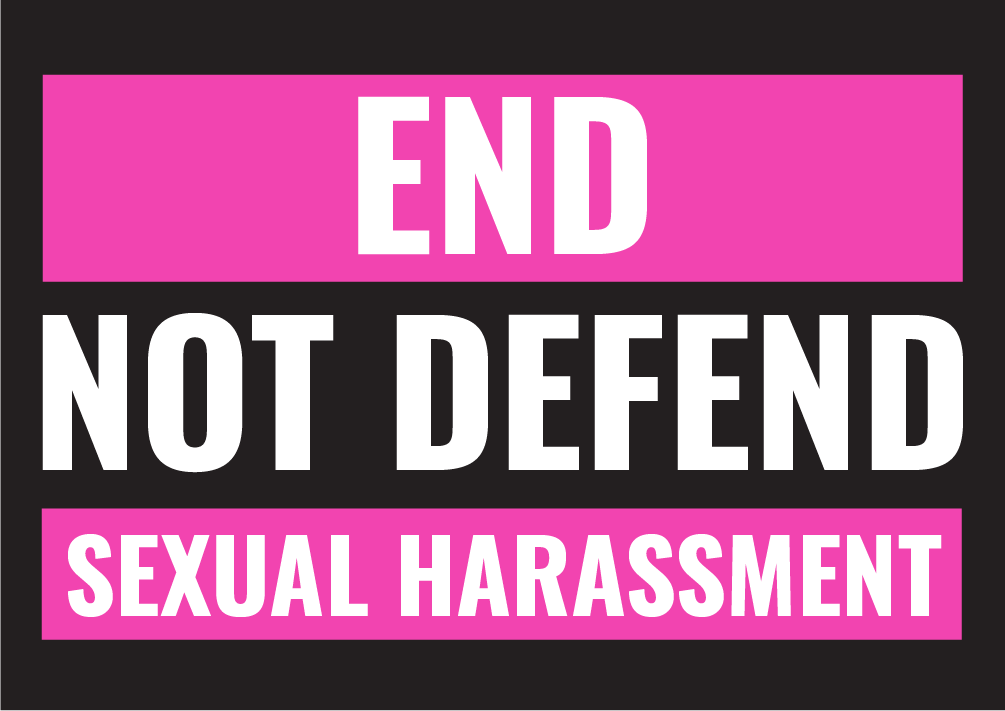Campaigns
End not defend
We’re campaigning for stronger laws to prevent workplace sexual harassment.

Why aren’t workplace complaint systems enough?
Sexual harassment continues to be a widespread issue in workplaces, with 2 in 5 (43%) women and 18% of men report having experienced sexual harassment at work. It also disproportionately affects workers in low paid, and insecure worker like young people, women, minoritised ethnicities, and those reporting a disability.
Most workers don't report sexual harassment due to fear of retaliation, damage to career prospects and weak reporting systems, or simply because they don’t understand their experiences.
What laws are we campaigning for?
We are calling for changes to the law that protect workers by forcing employers to proactively deal with and prevent sexual harassment in the workplace.
1
2
Safe ways to report workplace sexual harassment that are independent and confidential
3
Annual published reporting to bring harassment reporting in line with gender pay gap reporting.
4
Increased time limits for sexual harassment grievances to one year so that the impact is recognised
Real life stories
Names and identifying information have been changed to preserve anonymity. All stories have been quoted from the report.
Aamaya, 21 faced sustained harassment from a colleague at a desserts restaurant who 'knew where to do it where the cameras weren't there.' When she reported it: "I told him what happened, I even wrote it down, but he just said, "I just basically won't look into it." Being young and from a Muslim background created additional barriers: "if I were to take anything further my mum would know about it."
Hannah, 24, worked at a theme bar. Women staff had to wear revealing uniforms, while male colleagues wore regular clothes. "I didn't like the attention, guys were groping me." Management insisted "you had to wear the outfit or leave." While supervisors sometimes intervened with persistent harassers, the business model encouraged harassment: "Obviously you had to wear that outfit to get people to come in and buy more drinks."
Olivia, 22, worked at a chain restaurant on zero hours contract at minimum wage.
An assistant manager in his 30s told Olivia, "You're not this assistant manager's b***h. You're my b***h". She reported the assistant manager to her supervisor, and they advised her against telling management. The manager gave the perpetrator 'a smack on the wrist', which led to retaliation. Olivia’s hours were cut from '20, 25 hours to eight hours a week'. The assistant manager began sabotaging her work, "making bookings wrong and putting my name under it." She witnessed him harass multiple other women over two years, including inappropriate touching caught on camera, but no action was taken and she eventually left. He remained on staff.
Read all the stories and learn more about how workplace sexual harassment is enabled in this report:
Take action
Write to your MP using the template to demand the UK government support the ‘End not Defend’ campaign.
- Personalise the template to catch your MP’s attention. Introduce yourself and tell them why you feel this is important.
- If writing is not possible telephone their office at the House of Commons by calling 020 7219 3000 and ask to be put through to their office giving your MP’s name.
To get your MPs name and contact details, and to generate a customised message to them that you can copy and paste, just enter your name and postcode below.